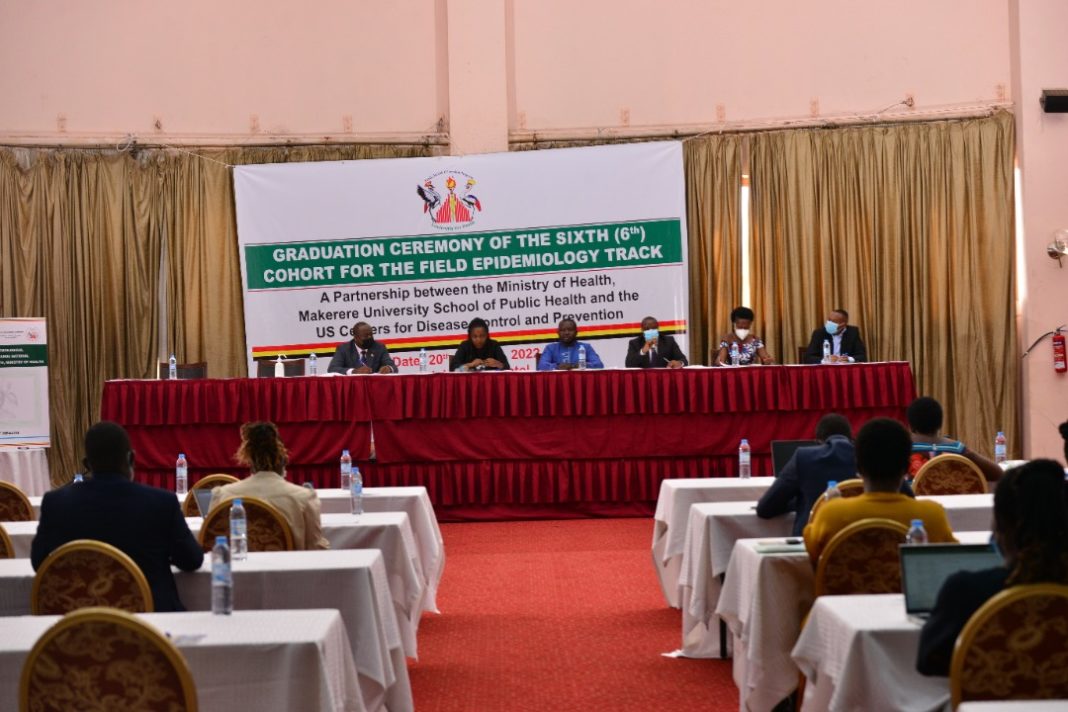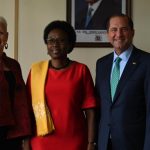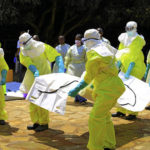The Uganda Public Health Fellowship Program-UPHFP has on Thursday 20th held its annual graduation ceremony for the Cohort of Fellows who completed their Advanced Field Epidemiology Training. The program is implemented by the Ministry of Health (MoH) in conjunction with Makerere University School of Public Health (MakSPH) and the US Centers for Disease Control and Prevention (CDC). It is a two-year training-in-service program aimed at equipping public health professionals with skills to manage public health challenges and become the next generation of public health leaders.
The ceremony which was held at Imperial Royale Hotel in Kampala was officially opened by Dr. Daniel Okello Ayen, Director of Public Health of Kampala Capital City Authority who represented Dr. Ruth Jane Aceng Minister of Health who highlighted the critical role played by the program in the effective response to and control of disease outbreaks.
The ceremony was also graced by many other dignitaries like H.E Natalie Brown, the Ambassador of U.S in Uganda, Dr. Simon Antara, Director AFENET, Prof Rhoda Wanyenze, Dean MakSPH, Dr. Yonas Tegegn Woldemariam, WHO country representative among others, who applauded the fellows for the great work done.
On behalf of MakSPH, in a jovial mood, Prof Wanyenze congratulated the 13 Fellows who have successfully completed their fellowship in advanced field epidemiology and said as a school, they are proud of the hard work and dedication fellows have put forth over the course of your fellowship and are pleased to welcome them to the ranks of alumni of field epidemiology.
“You should be proud not just of your achievement, but also your flexibility, resilience, and determination in shifting to online learning to complete your deliveries this past year because of COVID-19. I commend Cohort 2020 Fellows for adapting so quickly in the face of the unexpected challenges and unprecedented circumstances” Prof. Rhoda Wanyenze said.
MakSPH Dean further noted that much has changed in this world over the past few months, saying, this great comfort knowing that they are the next generation of public health leaders, are well prepared to help the world overcome the challenges of both today and tomorrow and to find solutions that will address public health needs in the country.
Each fellow made a summary of their achievements over the 2 years of training in applied epidemiology and public health practice, plus a detailed presentation of one of their projects. Fellows presented the evidence of competencies acquired in disease outbreak investigation, public health surveillance, oral and written scientific and nonscientific communication, and public health leadership. Fellows presented work ranging from response to disease outbreaks such as COVID-19, Measles, HIV/TB/HIV, HIV/Cervical Cancer, Anthrax, among others to client satisfaction surveys and health service delivery assessments in refugees and other settings. Fellows also implemented projects to improve disease surveillance and service delivery in health centers.
Fellows received the award of a certificate of completion of training in Advanced Field Epidemiology, and Dr. Richard Migisha one of the Fellows who did a study on COVID-19 outbreak at Moroto Prison, Northern Uganda, September 2020 emerged the best outstanding students out of 13 fellows.
Other Fellows are; Alex Ndyabakira, MPH, Aggrey Byaruhanga, Advanced Field Epidemiology Fellow, Immaculate Atusekera, Bob Omoda Amodan, Daniel Jacob Emong, Geofrey Amanya, Ignatius Wadunde, Job Morukileng, Josephine Namayanja, Elizabeth B. Katana, Patricia Thiwe, and Peter Omms Ouzos.
Epidemiological Bulletin Launched
In the same ceremony, a quarterly Epidemiological Bulletin of Uganda National Institute of Public Health, Ministry of Health has been launched by H.E Natalie Brown, the Ambassador of United States of America in Uganda. The Quarterly Epidemiological Bulletin is a publication supported by the Public Health Fellowship Program of the Ministry of Health and partners.
This Bulletin, whose Vision is to make public health data and information available to health management teams, policymakers, and the public, to inform policies, programs, and actions that improve health, where the fellows and others Ministry of Health, epidemiologists, and officers publish valuable public health information for consumption by the public and scientific world.
Some of the epidemiologists who welcomed this development say, the goal of this bulletin is to inform the district, national and global stakeholders on disease outbreak investigations undertaken in detecting, preventing, and responding to public health events in the country.
The Uganda Public Health Fellowship Program-UPHFP has enrolled 95 Fellows in Advanced Field Epidemiology since its inception in 2015, with the highest ever enrollment of 15 in 2022. Over the past 7 years, fellows have conducted over 120 outbreak investigations most of them on high-priority diseases of public health surveillance systems with the aim of improving detection of disease epidemic alerts and prompting an early response.
In addition, Fellows have made numerous presentations at national and international conferences, winning eight awards including the prestigious CDC director’s Award for Excellence in Public Health and Response at the 2017 and 2021 EIS conferences. Fellows have made significant appearances in the local media, contributing feature articles on key topics of public health importance.
The publication of the Uganda Public Health Bulletin, where Fellows have participated very effectively as editors and article contributors is another tremendous achievement. Twenty four-24 volumes have so far been produced since the commencement of the program. Additionally, PHFP has continued to contribute to the production of Malaria Quarterly Bulletin, National TB and Leprosy Program Bulletin, and Non-Communicable Diseases Bulletin, where the fellows and other MoH epidemiologists and officers publish valuable public health information for consumption by the public and the scientific world.
According to Dr. Henry G. Mwebesa, Director General Health Services, the program has so far produced over 150 manuscripts, submitted to reputable peer-reviewed journals, 60 of what have so far been published, and the other remaining ones have either been accepted or undergoing peer reviews at various levels.








